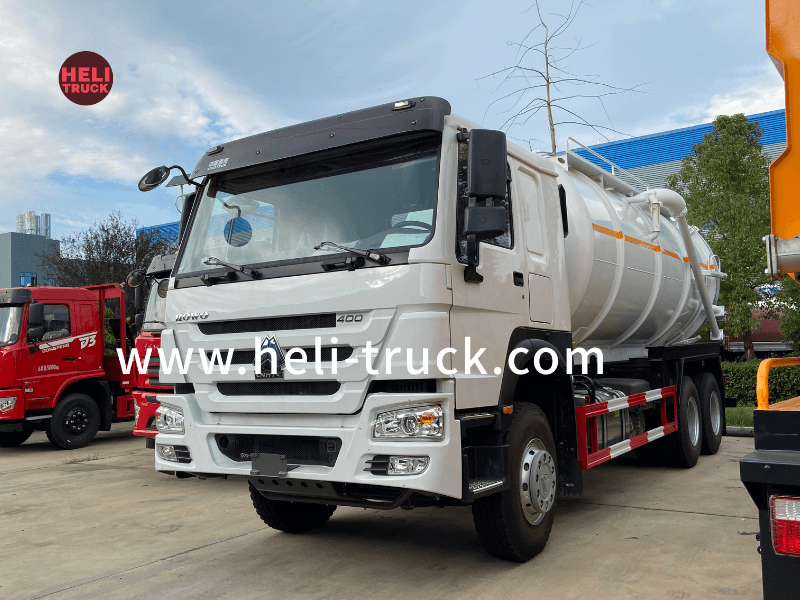Introduction
Vacuum trucks play a crucial role in various industries, including construction, mining, oil and gas, and wastewater management. These specialized vehicles are designed to efficiently collect and transport liquid and solid waste materials from job sites to designated disposal facilities. However, the disposal of waste generated by vacuum trucks must be managed properly to ensure compliance with environmental regulations, minimize environmental impact, and maintain operational efficiency. This is where waste disposal audits for vacuum trucks come into play.
What is a Vacuum Truck Waste Disposal Audit?

A vacuum truck waste disposal audit involves a systematic review and assessment of the waste disposal practices associated with vacuum truck operations. The purpose of the audit is to evaluate the entire waste management process, from waste collection and transportation to disposal, to identify areas for improvement and ensure compliance with relevant regulations and best practices.
Key Components of a Vacuum Truck Waste Disposal Audit
1. Waste Collection and Segregation Practices: The audit should assess how waste materials are collected and segregated at the job site before being loaded into the vacuum truck. Proper segregation of waste streams is essential to ensure that hazardous and non-hazardous materials are disposed of separately in compliance with regulatory requirements.
2. Refuse compactor truck repair : The audit should evaluate the transportation procedures followed by vacuum truck operators, including the handling and containment of waste materials during transit. Properly securing and containing waste within the vacuum truck is critical to prevent spills and avoid environmental contamination.
3. Disposal Site Selection and Compliance: The audit should include a review of the disposal sites used by the vacuum truck operators to ensure that they are permitted facilities that comply with all applicable environmental regulations. Improper disposal of waste materials can result in fines, penalties, and reputational damage for the organization.
4. Documentation and Record-Keeping: Proper documentation and record-keeping are essential components of waste disposal audits for vacuum trucks. The audit should verify that accurate records are maintained for each waste disposal transaction, including manifests, disposal receipts, and other relevant documentation.
Benefits of Vacuum Truck Waste Disposal Audits
1. Regulatory Compliance: By conducting regular waste disposal audits, vacuum truck operators can ensure compliance with federal, state, and local regulations governing the disposal of hazardous and non-hazardous waste materials. Compliance with these regulations is essential to avoid costly fines and penalties.
2. Environmental Protection: Proper waste disposal practices are crucial for protecting the environment from the potential impacts of hazardous waste materials. Waste disposal audits help identify opportunities to minimize environmental impact and implement best practices for waste management.
3. Operational Efficiency: Optimizing waste disposal processes through audits can improve operational efficiency for vacuum truck operators. By streamlining waste collection, transportation, and disposal practices, organizations can reduce costs, enhance productivity, and improve overall performance.
4. Risk Mitigation: Conducting waste disposal audits helps identify potential risks and vulnerabilities in the waste management process. By proactively addressing these risks, organizations can minimize the likelihood of incidents such as spills, leaks, and regulatory violations.
Case Study: Implementing Waste Disposal Audits for Vacuum Truck Operations
ABC Environmental Services is a leading provider of vacuum truck services for industrial clients in the oil and gas sector. Concerned about the increasing regulatory scrutiny on waste disposal practices, ABC Environmental Services decided to implement waste disposal audits for its vacuum truck operations.
1. Audit Preparation: ABC Environmental Services assembled a team of environmental compliance experts to conduct waste disposal audits at various job sites. The audit team developed a checklist of key audit criteria, including waste collection procedures, transportation practices, disposal site compliance, and documentation requirements.
2. On-Site Audits: The audit team visited multiple job sites where vacuum trucks were operating to observe waste management practices in real-time. They interviewed operators, reviewed documentation, and inspected waste containment and transportation equipment to assess compliance with regulatory requirements.
3. Findings and Recommendations: Following the audits, the team compiled a detailed report outlining their findings and recommendations for improvement. They identified areas where waste segregation practices could be enhanced, transportation procedures could be optimized, and documentation processes could be standardized.
4. Implementation of Audit Recommendations: ABC Environmental Services implemented the recommendations from the waste disposal audits by providing additional training to vacuum truck operators, updating procedures for waste segregation and transportation, and enhancing record-keeping practices. These improvements helped the organization achieve greater operational efficiency and regulatory compliance.
Conclusion
In conclusion, waste disposal audits for vacuum truck operations are essential for ensuring environmental compliance, minimizing environmental impact, and enhancing operational efficiency. By conducting regular audits of waste management practices, organizations can identify opportunities for improvement, address potential risks, and demonstrate a commitment to responsible waste disposal. Implementing the findings and recommendations of waste disposal audits can help vacuum truck operators optimize their waste management processes, protect the environment, and maintain a competitive edge in the industry.
